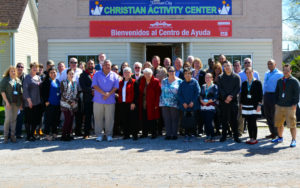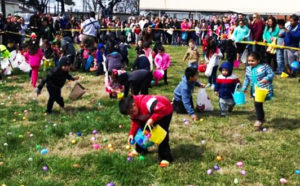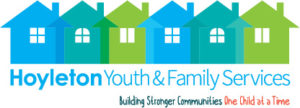United Church of Christ’s Hoyleton Youth and Family Services Program Builds ‘Bridges of Hope’ in Southern Illinois

The Puentes de Esperanza Welcome Center opened April 7, 2017, to offer support and resources to Latinx residents of southern Illinois.
The United Church of Christ’s Hoyleton Youth and Family Services has a long history of helping to create a better world for the children and families it serves. But with increased violence and prejudice against communities of color, one of its programs — Puentes de Esperanza (Bridges of Hope) — has taken on heightened significance, especially among the swiftly-growing Latinx population in southwest Illinois.
Since its founding in 1995, Puentes’ mission has been to transform the lives of Latinx children and families in southern Illinois through community-based ministries directed at their physical, emotional, social and spiritual needs. In the early 1990s, initial work administering a survey about community needs had uncovered a dilemma: “a vast majority of the residents spoke Spanish” and couldn’t answer the survey questions, says Hoyleton President and CEO Chris Cox. With the help of the UCC’s Embrace Living Communities, which provided translators, the completed survey highlighted a major need.
“We realized we had a huge, underserved [Latinx] population,” says Cox, and one that Hoyleton was determined to fill. Joining with the UCC’s Illinois South Conference — who had already teamed up with a local church to provide services to the Spanish-speaking community — Puentes de Esperanza was born.
Puentes is named for the local church that helped it get off the ground. Today, the program provides services in four areas: community outreach; bi-lingual counseling; an immigrant family resource program that helps individuals and families access public benefits, including the SNAP nutrition program and Medicaid; and Latinx special services — including interpretation and translation — in partnership with the Illinois Department of Children and Family Services (DCFS).
Language still a barrier
Even now, Cox says, language remains one of the largest obstacles Puentes helps children and families overcome. Serving as a presence, standing with Spanish-speaking residents of the region often is one of Puentes’ most significant ministries.

In a lighter moment of service, Puentes’ Welcome Center sponsored an Easter egg hunt for the community last spring.
“We are in the business of tearing down barriers and walls, and building bridges,” Cox says. “We are on the front lines in the smaller, rural communities, working to engage in conversation in a respectful way, to find the commonalities between people,” in order to change hearts and minds.
To that end, Puentes staff provide a weekly presence for the Latinx clients of the Illinois Department of Human Services offices throughout the state where, according to Cox, there is only one state-hired Spanish-speaking employee within the Southern Region. Translating and helping families walk through the maze of documents and procedures helps both the state offices and its clients, he says, because “everyone wants to do the right thing. We are able to help facilitate that.”
But language isn’t the only barrier. Like other CHHSM-member ministries with similar programs, Puentes provides services to people who fear that if they leave their geographic area, they won’t be able to come back. A recent attempt to partner with a large band uniform manufacturing company in providing decent sewing jobs fell through because potential employees “were afraid that if they moved out of their community, they would never see their kids again,” Cox says.
“The [Latinx] community here feels under attack,” he adds. And the fear is not without merit. “People are pulled over for little things — not using a turning indicator, for example — and are detained,” sent to a detainment center located in a rural part of Missouri, Cox says. “So then, there is no one at home to take care of the children.”
Out of necessity, Puentes decided to provide resources for families facing possible separations.
“We recruited attorneys willing to work pro bono to run seminars and workshops teaching parents how to plan for if something should happen — planning so that the kids will still be taken care of,” says Cox.
Partnerships are key
To meet the health and human service needs of the Latinx population in southwest Illinois, Puentes de Esperanza relies on many partnerships, both ecumenical and secular. For example, it partners with Lutheran and Catholic agencies to serve Spanish-speaking women with health initiatives, counseling and domestic violence intervention.
Another partnership is with the Mexican Consulate in Indianapolis, where Puentes provides training and resources to help Spanish-speaking people fill out paperwork and documentation, and even open bank accounts. The training and resources are invaluable in enabling Latinx residents to transfer money “without automatically being labeled as a drug cartel member simply because they’re transferring money to their relatives” out of the country, Cox adds.
Partnerships are increasingly important to Puentes and other Hoyleton programs because of the limited funds available to nonprofits. “We’ve been called to be part of a healthy community,” Cox says, “so we are called to bring in others to partners with us in serving the community.”
Building from its roots
Cox says that in helping the Latinx population in southwest Illinois, the subject of how individuals came to the United States is not broached.
“We made the decision that if you have a need, God has called us to help,” Cox says. “We don’t care what your status is, we’ll get you the services you and your children are entitled to,” including helping people get the resources they need to become legal residents if necessary.
 In that way, Cox says, Puentes de Esperanza harkens back to the German immigrants who, in 1895, founded the original Hoyleton Orphans Home to serve other German immigrants.
In that way, Cox says, Puentes de Esperanza harkens back to the German immigrants who, in 1895, founded the original Hoyleton Orphans Home to serve other German immigrants.
“We look at what we do today as following in that tradition,” Cox says. “We’re serving the new immigrants to this country.”
In the end, it’s simple, he says.
“The work we do is important. The families are important. The labels are not.
“We believe in dignity.”
Since its inception in 1895, CHHSM-member ministry Hoyleton Youth and Family Services has continually expanded its commitment to all people, young and old alike, who are in need. Today, Hoyleton enriches the lives of more than 1,500 people annually through its broad spectrum of residential and community-based services. These include therapeutic residential treatment and foster care, transitional and independent living programs, crisis care, Puentes de Esperanza and special education programs.
Join Our Mailing LIst
"*" indicates required fields
Follow on Facebook
New Resident Finds Belonging at Emmaus Homes - CHHSM
www.chhsm.org
Heather’s journey toward independence has been nothing short of inspiring. Since moving into her new home last year, Heather’s world has expanded in ways she never imagined. Leaving the familiarit...